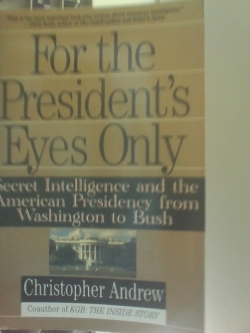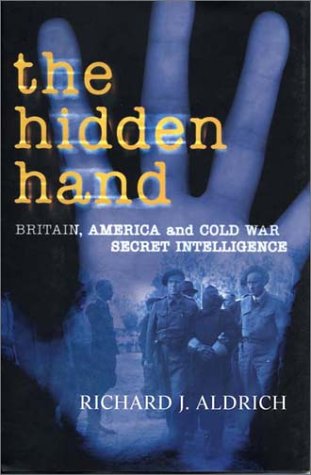For the President's Eyes Only: Secret Intelligence and the American Presidency from Washington to Bush

Buy online ($)
Type
Book
Authors
Andrew ( Christopher )
ISBN 10
0060921781
Category
327-International Relations
[ Browse Items ]
Publication Year
1996
Publisher
Harper Perennial;, United States
Pages
660
Subject
s: Intelligence service -- United States -- History; Secret service -- United States -- History; Presidents -- United States -- History; Intelligence operations; United States;
Abstract
This is an altogether fascinating book on how American Presidents have used, misused, or ignored secret intelligence in the 20th Century. Although Andrew provides a brief introductory chapter on how U.S. presidents from Washington onward have used secret intelligence, the balk of the book concerns 20th Century presidents from Woodrow Wilson to George W Bush (senior). From the beginning of the Cold War (1947-1992) CIA was the principal means by which successive presidents received secret intelligence. Therefore much of this book chronicles the dynamic relationships that developed between CIA directors and their most important individual customer, the President.
As this book makes clear, not all presidents understood the value and uses of the secret intelligence provided through CIA. Also the role of CIA as a purveyor of intelligence was muddied by its ability to conduct covert operations. More than one president was far more interested in the ability of CIA to engage in secret operations to achieve presidential national security objectives than the intelligence that it provided. According to Andrew, excluding John Kennedy, only two modern Presidents really understood the value,use, and limitations of intelligence. President Dwight Eisenhower, thanks to his WWII role as Supreme Allied Commander, came to the presidency with a clear understanding and appreciation of intelligence and established a good working relationship with CIA and the IC. President George W. Bush (Senior) actually served a year as CIA Director under Gerald Ford. This experience gave him an unprecedented understanding (for a U.S. President) of intelligence processes and capabilities as well as a clear understanding of the uses and abuses of covert action. Bush was a very well liked CIA and more importantly trusted. As a result, even if Bush disliked the then CIA Director William Webster, he had a fine sense of the importance of the intelligence that CIA produced. He even added Robert Gates, a career CIA officer, to his National Security Council (NSC). Almost unique among U.S. Presidents, Bush understood the vital differences between predictive and warning intelligence and never expected CIA to produce prophetic warnings on specific events.
As this book makes clear, not all presidents understood the value and uses of the secret intelligence provided through CIA. Also the role of CIA as a purveyor of intelligence was muddied by its ability to conduct covert operations. More than one president was far more interested in the ability of CIA to engage in secret operations to achieve presidential national security objectives than the intelligence that it provided. According to Andrew, excluding John Kennedy, only two modern Presidents really understood the value,use, and limitations of intelligence. President Dwight Eisenhower, thanks to his WWII role as Supreme Allied Commander, came to the presidency with a clear understanding and appreciation of intelligence and established a good working relationship with CIA and the IC. President George W. Bush (Senior) actually served a year as CIA Director under Gerald Ford. This experience gave him an unprecedented understanding (for a U.S. President) of intelligence processes and capabilities as well as a clear understanding of the uses and abuses of covert action. Bush was a very well liked CIA and more importantly trusted. As a result, even if Bush disliked the then CIA Director William Webster, he had a fine sense of the importance of the intelligence that CIA produced. He even added Robert Gates, a career CIA officer, to his National Security Council (NSC). Almost unique among U.S. Presidents, Bush understood the vital differences between predictive and warning intelligence and never expected CIA to produce prophetic warnings on specific events.
Biblio Notes
Tables of Contents
1. Introduction: the President and Intelligence………………………………………………..P. 1
2. From George Washington to the Twentieth Century…………………………………….P.6
3. The First World War and after: from Woodrow Wilson to Herbert Hoover… P. 30
4. Franklin D. Roosevelt: the Path to Pearl Harbor……………………………………………P. 75
5. Roosevelt at War (1941-1945) -- Harry S. Truman (1945-1953)……………… P. 123
6. Dwight D. Eisenhower (1953-1961)………………………………………………………………P. 149
7. John F. Kennedy (1961-1963)……………………………………………………………………… P. 199
8. Lyndon B. Johnson (1963-1969)……………………………………………………………………P. 257
9. Richard M. Nixon (1969-1974)………………………………………………………………………P. 307
10. Gerald R. Ford (1974-1977)…………………………………………………………………………P. 350
11. Jimmy Carter (1977-1981)………………………………………………………………………….P. 397
12. Ronald Reagan (1981-1989)……………………………………………………………………….P. 425
13. George Bush (1989-1993)……………………………………………………………………………P. 457
Conclusion: Intelligence after the Cold War………………………………………………………P. 537
1. Introduction: the President and Intelligence………………………………………………..P. 1
2. From George Washington to the Twentieth Century…………………………………….P.6
3. The First World War and after: from Woodrow Wilson to Herbert Hoover… P. 30
4. Franklin D. Roosevelt: the Path to Pearl Harbor……………………………………………P. 75
5. Roosevelt at War (1941-1945) -- Harry S. Truman (1945-1953)……………… P. 123
6. Dwight D. Eisenhower (1953-1961)………………………………………………………………P. 149
7. John F. Kennedy (1961-1963)……………………………………………………………………… P. 199
8. Lyndon B. Johnson (1963-1969)……………………………………………………………………P. 257
9. Richard M. Nixon (1969-1974)………………………………………………………………………P. 307
10. Gerald R. Ford (1974-1977)…………………………………………………………………………P. 350
11. Jimmy Carter (1977-1981)………………………………………………………………………….P. 397
12. Ronald Reagan (1981-1989)……………………………………………………………………….P. 425
13. George Bush (1989-1993)……………………………………………………………………………P. 457
Conclusion: Intelligence after the Cold War………………………………………………………P. 537
Number of Copies
1
| Library | Accession No | Call No | Copy No | Edition | Location | Availability |
|---|---|---|---|---|---|---|
| Main | 185 |
327.11 AND |
1 | Yes |




